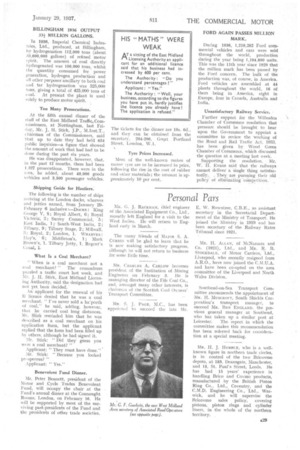BILLING HAM 1936 OUTPUT 331 MILLION GALLONS.
Page 31

If you've noticed an error in this article please click here to report it so we can fix it.
In 1936,• Imperial Chemical Industries, Ltd., produced, at Billingham, by hydrogenation 112,000 tons (about :33,600,000 gallons) of refined motor :Tina. The amount of coal directly hydrogenated was 100,000 tons, whilst the quantity consumed for power generation, hydrogen production and :ill other purposes ancillary to both coal and tar hydrogenation 'was 325,000 tons, giving a total of 425,000 tons of coal. At present the plant is used solely to produce motor spirit. ,.
Too Many Prosecutions.
At the fifth annual dinner of the staff of the East Midland Traffic,Commissioners, at Nottingham, last Friday, Mr. J. H. Stirk, J.P., M.Inst.T., chairman of the Commissioners, said that up to date they had held 654 public inquiries—a figure that showed the amount of work that had had to be done during the past six years.
He was disappointed, however, that, in the past 12 months, there had been 1,327 prosecutions. There were in the area, he added, about 40,000 goods vehicles and 3,500 passenger vehicles.
Shipping Guide for Hauliers.
The following is the number of ships arriving at the London docks, wharves and jetties named, from January 29February 6 inclusive :—DocKs : King George V, 8; Royal Albert, 6; Royal Victoria; 3; Surrey Commercial, 5; East India, 1 ;• South-West India, 2; Tilbury, 9; Tilbury Stage, 2; Millwall, ; Royal, 2; London, 1. WHARVES; 1 6; Middleton's, 1; Mark Brown's, 1. Tilbury Jetty, 1. Regent's Canal, 1.
What Is a Coal Merchant?
"When is a coal merchant not a coal merchant? " The conundrum puzzled a traffic court last week, and Mr. J. H. Stirk, East Midland Licensing Authority, said the designation had not yet_ been decided.'
An applicant for the renewal of his B licence denied that he was a coal merchant. " I've never sold a ha'potth of coal," he said, adding, however, that he carried coal long distances, Mr. Stirk reminded him that he was described as a coal merchant on his application form, but the applicant replied that the form had been filled up by others, although he had signed it.
)fr. Stirk: "Did they guess you were a coal merchant? "
Applicant: " They must have done." Mr. Stirk: "Because you looked prs siperous? "
Applicant: " Yes."
Benevolent Fund Dinner.
Mr. Peter Bennett, president of the Motor and Cycle Trades Benevolent Fund, will occupy the chair at the Fund's annual dinner at the Connaught Rooms; London, on February 16. He will be supported by most of the surviving past-presidents of the Fund and the presidents of other trade societies. The tickets for the dinner are 10s. 6d., and they can be obtained from the secretary, 204-206, Great Portland Street, London, W.I.
Tyre Prices Increased.
Most of the well-known makes of motor tyre are to be increased in price, following the rise in the cost of rubber and other materials; the amount is approximately 10 per cent. FORD AGAIN PASSES MILLION MARK.
During 1936, 1,219,262 Ford commercial vehicles and cars were sold throughout the world, production during the year being 1,194,800 units. This was the 11th year since 1920 that the million mark has been passed by the Ford concern. The bulk of the production was, of course, in America. Ford vehicles are assembled at 44 plants throughout the world, 16 of them being in America, eight in Europe, four in Canada, Australia and India.
Unsatisfactory Railway Service.
Further support for the Willesden Chamber of Commerce resolution that pressure should be brought to bear upon the Government to appoint a committee to review the -working of the Road and Rail Traffic Act, 1933, has been given by Wood Green Chamber of Commerce, which discussed the question at a. meeting last week.
Supporting the resolution, Mr. W. H. Evans said that the railways cannot deliver a Single thing satisfactorily... . They; are pursuing their old policy of eliminating .cOurperitiOn.'




















































































